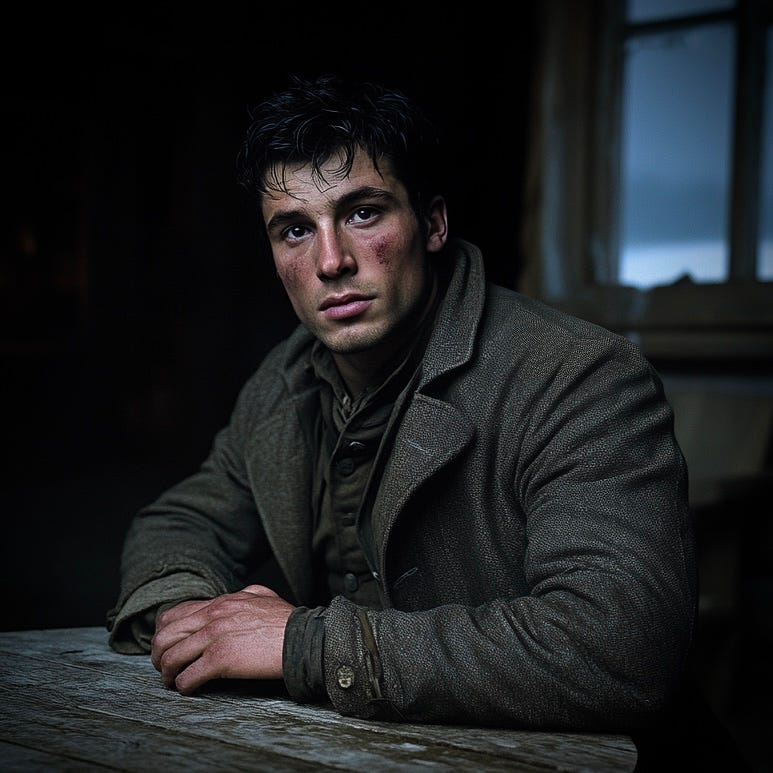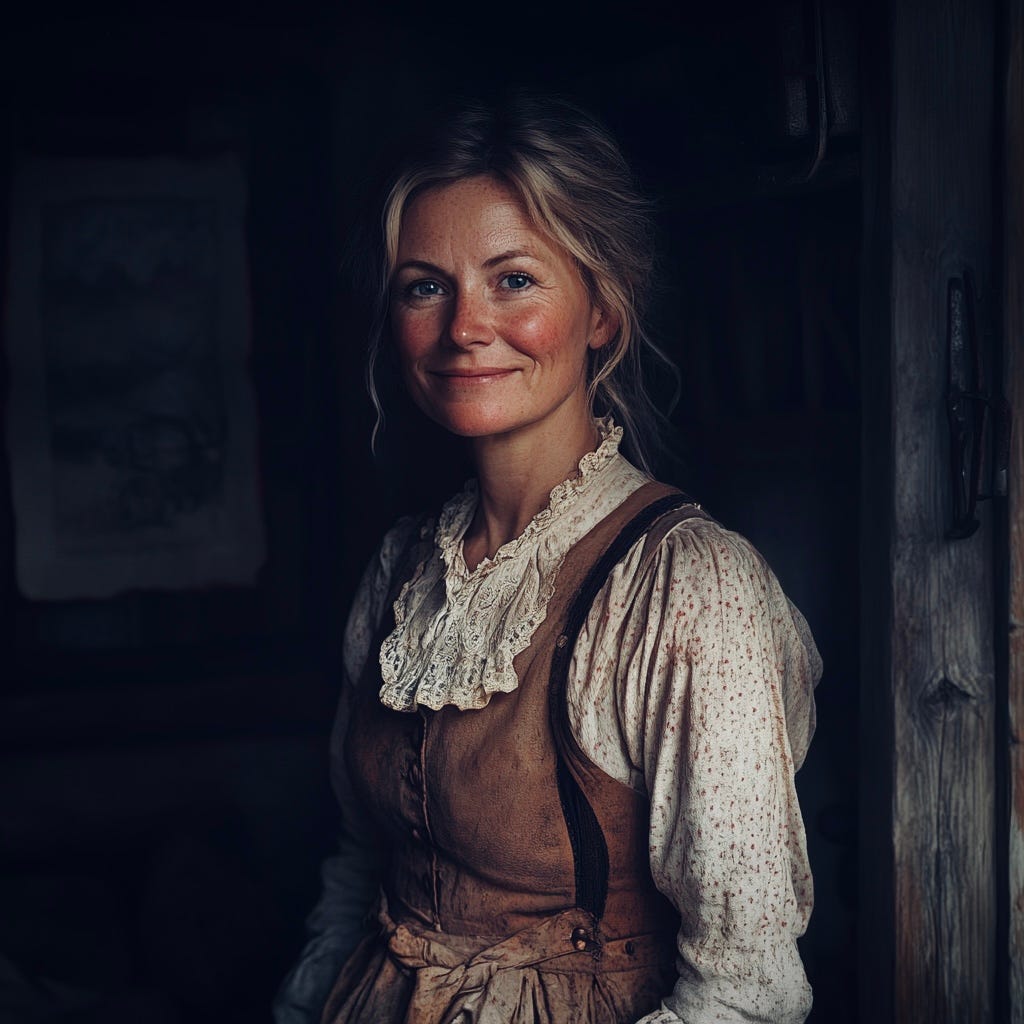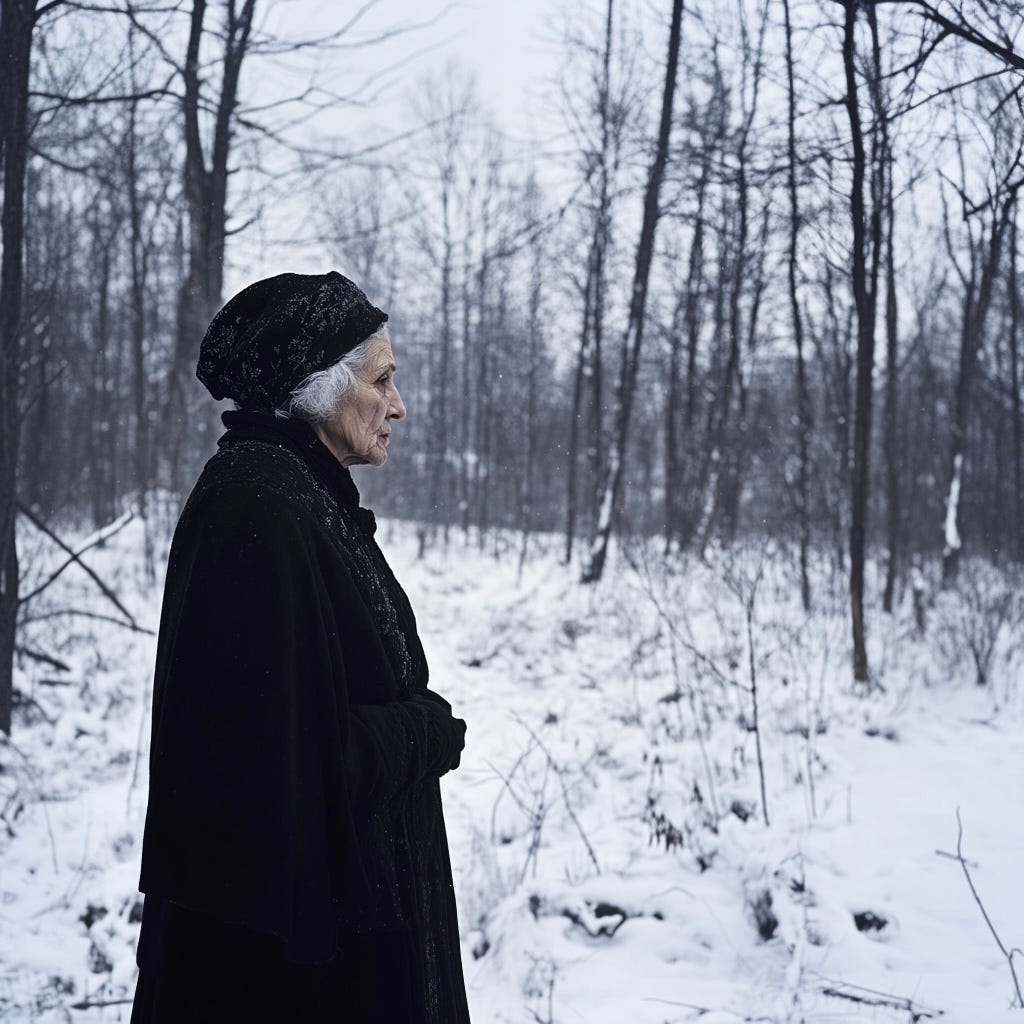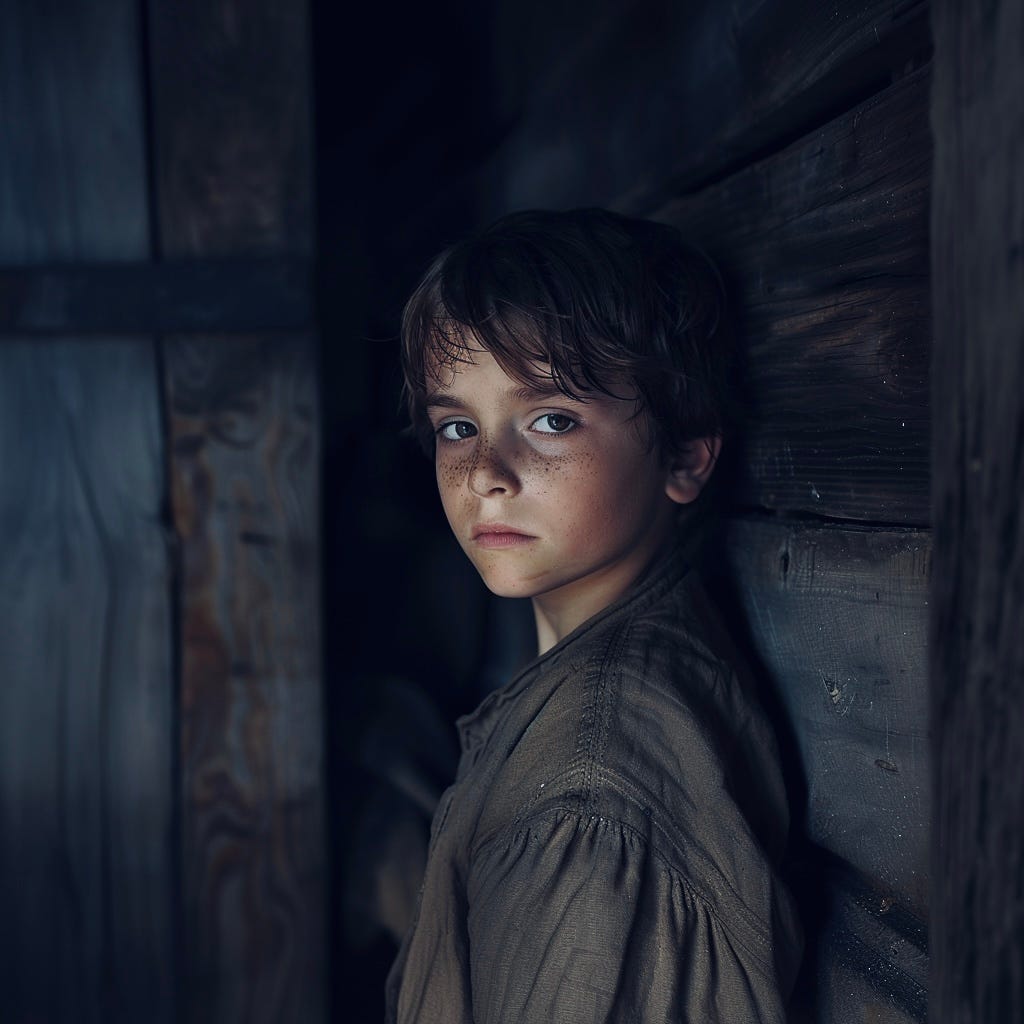The final chapter of Book II is more than six thousand words, so I have divided it into two posts.
Book II, Chapter 26: Joseph
List of Chapters | Previous Chapter
Darkness retreated before the advancing dawn. The winter morning came, lynx-eyed, into the carriage house, like a thief in the night and purloiner of the same, which in many ways it was. It rolled up and took away the black velvet shadows until the wood grain in the walls was discernible again.
The cloudless sky outside had taken on the hues of dead cinders, which seemed fitting, since 22 February 1871 was Ash Wednesday, though the only person at the Eltzbacher Coach Inn mindful of this was Hermann.
He occupied the round table facing the Franklin stove. Monika asked him yet again if he wanted her to prepare a cold breakfast for him. Ashamed to admit he was observing his first Lenten fast in four years, he mouthed an excuse about having eaten too much the night before, and stifled the matter in a husky yawn.
He had been a devout Catholic, some would have said a fanatical one. But his faith had been sorely shaken in the wake of his children’s murder on Holy Saturday, 1867. Since then he had strayed from the true path and stumbled down many crooked ones. If he had sought re-initiation into a local parish, he would have had to confess that he was living under a false name to avoid being persecuted for crimes he did not commit.
Ruefully, he crossed himself: “Forgive me, Father, for I have sinned. . .”
Monika smiled indulgently. She was not religious, but found the man’s solipsistic ways pitiable yet endearing. She did not believe God, but she sensed that the man whom she knew as Moritz had access to otherworldly abilities beyond her understanding. Had he not ministered to Benedikt and brought him back from the brink of madness?
To her he was a wonderworker—a thaumaturge, a word she not only knew the meaning of, but could have declined in the original Greek (and construed in a sentence), if she had been called upon to do so. Monika had been steeped in the Classics when she was young; and was more familiar with the Roman authors than Benedikt, who had ostensibly been her tutor.
But in later years the urgencies of quotidian life (from quotidianus, meaning “daily”) had obliged her to give up these toys of the mind. Lacking confidence in herself, she had affected an air of studied ignorance when it came to all things intellectual so as not to provoke arrogant men or unintentionally hurt the feelings of the uneducated.
Whenever the two of them were alone and Hermann glanced at Monika, color overspread his cheeks, and he was shot through with guilt at not being able to control this reaction. It was rooted in a yearning for female companionship. He wanted to confide in her, to speak to her in ways he was precluded from doing in consideration of the fraternal bond he shared with her husband.
As a boy he had never cultivated the art of making friends, having channeled his energies into fortifying and maintaining the ties of blood and kinship, which he had been taught were the only things that made his life significant. But when these ties were abruptly severed, he found himself adrift on a sea of utter loneliness.
There was Walter, of course. But Walter was a boy. His breadth of experience was limited. But the orphan was shrewder than most gave him credit for, having learned early on that adults were not to be trusted. He had been a pickpocket on the streets of Berlin until being apprehended and sent to the Schorn Foundation in Cronenberg.
Then there was the American occultist, Marty Fitzsimmons, whom Hermann would probably never see again. Fighting back tears, he recalled what Benedikt told him of Marty, and how the man had loved him, and how selfless and tragic that love had been. Finally, there was Benedikt himself. But the Tyroleans knew their relationship was fast approaching its end.
On the table by the candle were some sheaves of paper that Benedikt had torn from the notebook in which he had chronicled the werewolf’s history. One page was scribbled over with measurements and a diagram that Benedikt had sketched yesterday to show what they needed to do in order to seal the gap in the stovepipe, which they had later fixed.
Hermann grabbed a blank page and picked up the graphite pencil, tip of which was still sharp. Fitfully, he doodled to while away the minutes until Benedikt’s return, at which time they would head to the stable to exercise the horses. Monika hummed a folk song, pulling the sofa from the wall to sweet the soot that had collected behind it the night of Benedikt’s emotional collapse, when he had boiled water on the flat-irons and the black smoke had poured out of the broken stovepipe making the air almost unbreathable.
Hermann fell into a kind of trance, cross-hatching here, shading there. And when he stopped, he set the pencil down and leaned back in the chair. Before him was a sketch of the Blessed Virgin in half profile. It was the best thing he had ever drawn.
He thought of the story of Frater Melchior (his distant ancestor), and how the man had acquired unusual abilities the villagers wrongly deemed to be God-given. He touched the chain on his neck and felt the weight of the accursed medallion pressing against his breast.
When Monika had finished sweeping, she shoved the sofa against the wall with her knees, and went to the table. She tilted her head, appraisingly, to examine the picture. “You’re a regular artist, Moritz.”
Since the image was a representation of the Mother of God, Hermann dared not destroy it. He handed it to Monika over his shoulder, and laid the pencil down. “Keep it . . . as a gift.”
“Oh,” she said in, embarrassed. “Thank you.”
Outside they heard Benedikt calling Monika’s name. The ostler had been in the coach inn emptying out the ashes from the stove in the kitchen and building the fire in the common room.
Monika went to the window and raised the sash. Hermann joined her. They saw Benedikt and Walter standing together at the back door of the coach inn. The orphan looked wretched.
“What’s wrong?” Monika asked.
“Go to the cottage and help Frau Eltzbacher. Abner passed away last night.”
Monika grabbed her shawl and left the room. When she was gone, Hermann stooped and picked up the drawing she had dropped. He folded it in half and removed Benedikt’s Latin primer from the shelf above the sofa, placing the image between the pages and re-shelving the book.
He heard ashes fall from the stove’s firebox. He dipped his fingertips in the cinders and wiped these through his forelock, saying, “Remember you are dust, and to dust you return.”
The obsequies and rites attending Herr Eltzbacher’s death were so new to Hermann that he kept asking Benedikt to explain them.
Why was Herr Eltzbacher’s corpse taken to a building next to the synagogue to be washed when the burial was to take place before corruption could set in? Why did Frau Eltzbacher stop speaking to them once the coffin had been lowered into the ground? Why was Walter ejected from the Eltzbachers’ cottage, when it was clear his presence would be a comfort to Frau Eltzbacher at this time?
Benedikt told Hermann that it was not his place to comment on these matters. “Our job is to manage the inn for the next seven days, while Frau Eltzbacher sits shiva.”
“What’s that?”
“A period of mourning. Until it ends, our contact with her must be relayed through intermediaries. We should not go to the cottage unless invited.”
Walter retrieved his pet cat (Mürrisch) from the cottage and brought him back to the carriage house, confining him in his own bunk room behind the movable partition, which Hermann and Benedikt had rigged up to keep the cat from getting out.
From the living room where the four of them gathered for supper that night, they heard the slumbering cat’s loud purring.
The orphan sat glumly over his porridge, as the adults ate in silence. The boy had been taking care of Herr Eltzbacher, who had been convalescing after a fall.
”Florian,” Monika said, “You’re a growing boy. You need to eat.”
“Why do you talk to me like I’m a child?” Walter asked. “Herr Eltzbacher never talked to me like that.”
“Mind your manners,” Benedikt said.
Hermann was so hungry that he was absorbed in his porridge, which contained nothing to violate his fast. He was ignoring the story; and this was rankling Walter, who kept his eyes on Hermann as he talked.
“I was in the room when Herr Eltzbacher died,” he said. “I fell asleep in the chair next to his bed. My forehead was leaning on the edge of the mattress. You know that photograph of the Eltzbachers’ son Joseph? The one in the common room? Well he was in my dream. He stood behind me. I knew he was there, but I couldn’t turn around. Someone patted me on the head and I woke up.
“Herr Eltzbacher was wide awake but his hands were clutching the bedcovers so it could not have been him who woke me. Mürrisch was asleep. But when I opened my eyes, the cat opened his one eye; and it glinted in the moonlight. Herr Eltzbacher turned to me, smiling. He looked so happy and peaceful. He said, ‘I knew you’d come back, Joseph.’ And then he died.”
Walter picked up his spoon and tried to eat, but was overcome that he put down again. Monika leaned over and embraced him.
But something happened to Hermann. He was casting his eyes about the room, because the medallion was disclosing a revelation to him. It came with the suddenness of a thunderclap. Walter had never known his parents. He was born ten, maybe eleven years ago in Berlin. Joseph was murdered in Berlin on Christmas Day, 1860. A woman’s voice spoke to Hermann: See how deftly we weave these threads? If you are not careful, they boy’s will be cut.
Hermann leaped from the chair; and it fell behind him.
Walter was so startled that he overturned his bowl, spilling the porridge on the floor. This woke the cat, whose purring stopped. But the animal made no other sound. Monika stole a glance at Benedikt, searching for an explanation. But the ostler stared at Hermann, brows contracted.
“I’m sorry,” Hermann mumbled. “I’m turning in for the night.”
Once the spill had been cleaned up, the other three retired as well.
Hermann lay on the lower bunk bed, listening to Walter sobbing on the other side of the wall. He didn’t know if the boy was still grieving for Herr Eltzbacher’s passing or was upset by Hermann’s neglect at the table.
He wanted to hug Walter, tell him he was sorry. But it was late, and freezing in the carriage house. He didn’t want to get out of bed and make a ruckus, fiddling with the wooden partition covering Walter’s room. And then there would be the grumpy cat to contend with.
He rolled his head away from the wall, and contemplated the wooden memento mori on the table opposite. Next to it was his father’s straight razor and what was left of the cracked shaving mirror. Before climbing into bed, he had removed the medallion, draping chain over the upraised arm of the carved figurine.
Hermann did not realize that by the time his head had rolled to face these objects, he was already asleep.
He dreamed that the beams of the moon glanced off the cracked glass of the mirror and shone directly into his eyes, no matter which way he looked. It was as if something taunted him. He felt the taloned hands of a form, semi-human and sexless, pressing down on him. Roughly, it parted his legs with its own. When he opened his eyes, the werewolf lay atop him.
The thing flicked its claw against Hermann’s neck and severed his carotid artery.
With a start Hermann shoved the monster off, and heard it crash beside him with a thump. He woke to the sound of claws scrabbling on the floorboards. He sprang from the bunk and clapped his palm to his neck. It was sticky with blood, but no artery had been severed.
Mürrisch jumped onto the table and batted the memento mori to the floor with one paw: “Mmmm, lecker, lecker, lecker, lecker,” the cat seemed to say. “Yummy, yummy, yummy, yummy.”
A man-sized figure, tall and furry, was in the corner of the room, tiptoeing backward until it melted into the wall’s shadows.
“I’ve had enough of you!” Hermann roared, grabbing Mürrisch by the scruff of his neck, and yanking him from the table. He carried the cat out of the room in an iron-fisted grip.
“Papa!” Walter screamed, stepping out of his own bunk room and confronting Hermann in the corridor.
Hermann elbowed the orphan aside, stomping barefoot down the steps. The feline howls grew louder and more ominous. With its legs thrashing and its claws extended, the cat scratched at the arm that held it, tearing the cloth of the flannel nightshirt.
Walter followed, moaning.
“What’s going on?” Benedikt exclaimed, grabbing his coat from the peg and pursuing both down the steps. Amid a clang of tools in the lower level, Benedikt heard the snick of a blade drawn from a sheath.
“Papa, I don’t know how he got out!” Walter sobbed, clutching at Hermann’s nightshirt and tugging at the arm that held the knife. “Please don’t!”
In alarm, Benedikt called out: “Don’t brandish the knife around the boy, Hermann!”
But Hermann kept the flat of the blade flush against his waist. Violently he shrugged the orphan off of him; and Walter fell backwards, tripping over a pail and landing on the dirt floor. Hermann unlatched the side door with one elbow and shouldered it open.
Once outside, he could feel the brittle snow on the pads of his feet. Without a second thought, he gutted the one-eyed cat—as his father had done long ago—and cast the animal into the snow. It spasmed in its death throes, quivering legs awry. At last it grew rigid and stopped moving altogether.
Hermann looked behind him. Walter gaped in shock and disbelief. Reaching the threshold, Benedikt saw the spray of black blood staining the snow. At its center lay the carcass of the butchered cat.
“I hate you,” Walter said. “I’ll never speak to you again. I was there for you when you lost everything and had no friend in the world. You just killed the best friend I ever had. I can’t believe I ever trusted you. I can’t believe I ever called you father.”
The boy dashed across the yard to the coach inn, slamming the back door behind him once inside.
Benedikt grabbed the knife from Hermann’s hand, swearing under his breath. He eyeballed the moon to gauge what time it was.
Hermann touched his neck again. The scratch had been superficial. “That cat was a witch’s familiar,” he grumbled. “You and I were agreed on that point.”
“I know,” Benedikt said.
“I’m going to go talk sense into him.”
“Don’t. You’ll only make it worse. And you’ll wake the inn’s guests.”
As Benedikt spoke, Hermann looked up at Monika watching them from the upper window. He wondered how much of the conversation she was able to hear through the leaded glass. Benedikt blurted my real name in the carriage house, he thought. He bent down and grabbed a fistful of snow, washing the blood from his nightshirt as best he could.
“He’s just a boy,” Hermann said. “We’ve been through too much together for him to be mad about something as insignificant as this.”
But Walter did not get over the slaying of his pet. He refused to go back to the carriage house. He stayed in the coach inn, sleeping on the warm irons of the kitchen stove. He stopped speaking to Hermann.
But there was no place for the boy to go, and he was not a fool. “He won’t find a better situation than the one he’s in,” Benedikt assured Hermann.
The ostler was right. Walter did not run away. There was nowhere else he could go. But the orphan eschewed the carriage house, except to use the latrine behind it. And though he took direction from Monika and Benedikt, he walked away whenever he saw Hermann approach.
Elischewa’s brothers were sent for on the day Abner and arrived in time for the burial. Her younger brother returned to Kohlendorf the next day to manage the tack shop. But the elder remained for the duration of shiva. On the last day, he went to Monika to inform her that Frau Eltzbacher was ready to receive her staff.
“It would be best if you were to arrive at the cottage two hours before sunset,” he said. “And she would prefer that the boy not be with you.”
Monika relayed these instructions to the men. When the trio had donned the finest clothes that they had, they left the carriage house, cutting across the yard and taking a back way that led through the trees, so as to avoid the children playing in the snow before the inn.
Walter was carrying a bucket of water from the well. He saw them, but averted his eyes.
When Hermann saw that the boy had buried the cat in a clearing and marked the grave with a cross made of sticks and twine, he became irritated. The symbol was too sacred to be planted over the grave of an animal, especially one sent by the Devil. When Monika and Benedikt passed him, he plucked the cross from the snow and unwound the twine around it. He stuffed it in his pocket to reuse it, snapped the sticks in half and cast them aside.
Elischewa’s brother was coming out of the cottage when they arrived at the frozen herb garden. He did not speak, but touched the brim of his hat by way of greeting. Since he was already at the threshold, he held the door open and beckoned them to enter. This done, he quietly closed it and walked to the coach inn.
The drapes were drawn. The room was dark. The yahrzeit candle burned on a table close by. A girl in a headscarf rose from a stool and exchanged a knowing look with Elischewa. She gathered her belongings and remarked that her sister would be by in a few hours to take her place. Then she departed.
When the latch clicked behind her, Benedikt cleared his throat and launched into an oration, expressing their collective sympathy for Frau Eltzbacher in her time of loss. He enumerated Herr Eltzbacher’s many virtues, with anecdotes exemplifying his generosity and goodness of spirit. Elischewa studied the carpet through it all. When Benedikt had finished, she bobbed her head twice, but did not thank him.
“The three of you have served me well,” she said. “I hope you will remain here for the next few months. But there are facts and circumstances I must apprise you of. Many years ago, Abner and I had something called a jointure drawn up, which affirms that, if he passed before me, I would become sole owner of the coach inn. But I am old, and do not know how much time I have left. If a legal instrument is not in place when I die, the property will revert to I know not whom.”
She sighed heavily, and plucked at her black gown. “My eldest daughter and her husband live in Stettin. My brothers have wired her from Kohlendorf to inform her of her father’s passing, and request that she travel her in the summer so that I can transfer to her what I feel is hers by right. My other children have been apprised of the situation,” she said flatly. “But none of them wants anything to do with the coach inn. . . .
“I do not know if my daughter will accept the proposition; or, if she does, whether she will continue to run the business. It is possible the three of you will need to find alternative arrangements. My brothers and I will help you find. We have many trusted and long-standing partners and associates whom we can draw upon for that. You will provided with excellent references, and a sum to compensate you for all you have done.”
The three of them looked at one another sadly. Benedikt expressed their gratitude. Monika clasped Elischewa’s hand and said that none of them could have found a more just or fair employer in the Rhineland than Frau Eltzbacher.
“Hear, hear!” Benedikt and Hermann assented.
“When you return to the inn,” Elischewa remarked, wiping her eyes with her kerchief, “will you please send him over so that I can speak to him?”
“Do you mean Florian?” Monika asked.
“Is that really his name?” Elischewa asked. “Or is it Walter?”
Hermann froze. He recalled the night in December when he had inadvertently let Walter’s name slip in the presence of Frau Eltzbacher. He turned to Monika, but her expression betrayed that she also knew that Florian was not the orphan’s real name.
“It doesn’t matter,” Elischewa whispered.
“What?” Hermann said, throat dry.
“I said, it doesn’t matter what his name is. I have a deep regard for him. He loved my husband. And I love him for that.”
After their visit, the three of them and Elischewa continued to refer to Walter by the pseudonym that Hermann had given him.
February progressed into March. And though the ice began to thaw, the orphan’s coolness toward Hermann did not.
Business picked up. And each day many soldiers were seen marching north and south on the main highway in front of the coach inn, some heading into France to relieve units still garrisoned there, while others were returning, exhausted, from the front. A formal treaty between France and Prussia had still not been signed.
None of the soldiers so much as strayed onto the long drive of the Eltzbacher Coach Inn, which Benedikt and Hermann found encouraging. But Elischewa would not take her eyes off of them until they were gone.
The daughter in Stettin wired back to inform her mother that the thought of leaving Pomeraia and the life she had built up there was intolerable to her. But her husband’s youngest brother was newly married and needed a place to live and raise his family. So it would be they who would be coming to the Rhineland to claim the property on behalf of Elischewa’s daughter.
That night, old woman sat in the wingback chair of the common room next to the blazing hearth. She studied the flames as it consumed the telegram. Behind her, at the long table, several young men who had been traveling together were drunkenly singing a bawdy song. Since there were no other guests at the inn for them to disturb, Frau Eltzbacher let them be.
Walter placed another bottle of wine on the table and went to Frau Eltzbacher, sitting down in the wingback chair facing her. He had spent many hours in that same seat, listening to Herr Eltzbacher tell marvelous tales. When the orphan saw tears rising in the old woman’s eyes, he said, “I miss him too.”
She smiled and lifted her gaze from the boy to the framed ferrotype on the wall above him, a photograph of Joseph dressed in Prussian regimentals.
Elischewa had been in her fourth decade when it had become apparent that she was expecting another child.
“The best you can hope for,” the midwife had said, “is that you or the baby will survive the birth.” But when Elischewa repeated this to Abner, he smiled and said, “Adonai yireh” (the Lord will provide).
The child was born, the mother survived. Joseph lived to be the same age as she had been when she bore him. And Elischewa had loved him more than her other children. For Joseph was the son of her old age.












